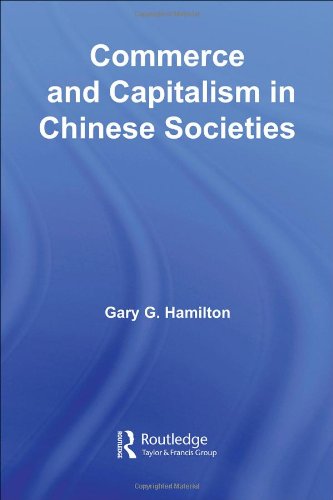

Most ebook files are in PDF format, so you can easily read them using various software such as Foxit Reader or directly on the Google Chrome browser.
Some ebook files are released by publishers in other formats such as .awz, .mobi, .epub, .fb2, etc. You may need to install specific software to read these formats on mobile/PC, such as Calibre.
Please read the tutorial at this link. https://ebooknice.com/page/post?id=faq
We offer FREE conversion to the popular formats you request; however, this may take some time. Therefore, right after payment, please email us, and we will try to provide the service as quickly as possible.
For some exceptional file formats or broken links (if any), please refrain from opening any disputes. Instead, email us first, and we will try to assist within a maximum of 6 hours.
EbookNice Team

Status:
Available4.5
37 reviews
ISBN 10: 0203645952
ISBN 13: 9780203645956
Author: Gary Hamilton
This informative book discusses the effects of the rise of Chinese capitalism on both China itself, and on its neighbours. Incorporating empirical data collated from interviews in several Asian societies and from historical Chinese sources, this renowned author analyzes, discusses and applies an institutional approach derived from the writings of Max Weber to explore the various aspects of Chinese economic practice. Consisting of sixteen articles that come together to provide historical, comparative and theoretically informed perspectives on the spread of Chinese capitalism, this collection emphasizes the difference between Western and Chinese forms of capitalism. Including sections on China's pre-industrial economy as well as the growth of modern Chinese capitalism, this collection will be a valuable resource for students of Asian and Chinese studies as well as those concerned with the economics of Chinese societies.
Part I: China’s pre-industrial economy in comparative perspective
1 Civilizations and the organization of economies
Civilizations and the analysis of Western modernity
The Weberian alternative and the organization of economies
The institutional embeddedness of economic activity
Christianity and capitalistic economic organization
The rise of Western rationalism and economic organization
Conclusion: Western civilization and the rise of Asian capitalism
Notes
2 Why no capitalism in China?: Negative questions in historical, comparative research
Theories of no capitalism
The organizational structure of late-imperial Chinese commerce
Conclusion
Notes
3 Chinese consumption of foreign commodities: A comparative perspective
Consumption of foreign commodities during the Qing
The faulty merchandise and marketing explanations
The culture explanations
The status competition explanation
Conclusion
Notes
4 The importance of commerce in the organization of China’s late-imperial economy
The “sprouts of capitalism” debate
Flexible production in pre-industrial China
Consumerism, brand names, and product differentiation in pre-industrial China
The organization of merchant networks
The market power of regional merchant networks
The growing importance of regional merchant groups in the 19th and early 20th century
Conclusion
Notes
Part II: Chinese capitalism in Asia
5 Hong Kong and the rise of capitalism in Asia
Two trajectories of Asian capitalism
Japan’s corporatized political economy
Chinese entrepreneurial capitalism
Economic development in the second half of the twentieth century
Notes
6 Remaking the global economy: U.S. retailers and Asian manufacturers
Introduction
Before the retail revolution
The national organization of U.S. retailing between 1945 and 1965
The globalization of supplier markets for U.S. retailers after 1965
Conclusion
Notes
7 Reflexive manufacturing: Taiwan’s integration in the global economy
The rise of small and medium-sized enterprises (SMEs) in Taiwan: the importance of the initial stage
The economic organization of the SMEs: the connections of global economy
The post-Plaza Accord transformation of Taiwan’s economy
The transformation of Taiwan’s reflexive manufacturing
Conclusion
Notes
8 Asian business networks in transition, or what Alan Greenspan does not know about the Asian financial crisis
What Alan Greenspan predicts
Greenspan’s picture of global capitalism
What is missing in this vision of capitalism?
Transformations in the global economy
The changing integration of Asian business networks into the global economy
The crisis
Conclusion
Notes
9 Reciprocity and control: The organization of Chinese family-owned conglomerates
The Chinese family firm as an object of comparative analysis
The inner and outer manifestations of Chinese patriarchal control
The three-way distinction between ownership, management, and control
Conclusion: the globalization of Chinese family enterprises
Notes
10 Competition and organization: A re-examination of Chinese business practices
Competing for the Chinese consumer
Conspiracy or combination
The organizational dimension
Conclusion
Notes
11 Ethnicity and capitalist development: The changing role of the Chinese in Thailand
Configurations of Chinese capitalism in Thailand
Patrimonial rulership and dependent capitalism
Royal patronage and the Khaw family
Pariah entrepreneurship and the Sophonpanich family
Global capitalism and the Charoen Pokphand family
Conclusions
Tags: Gary Hamilton, Commerce, Capitalism